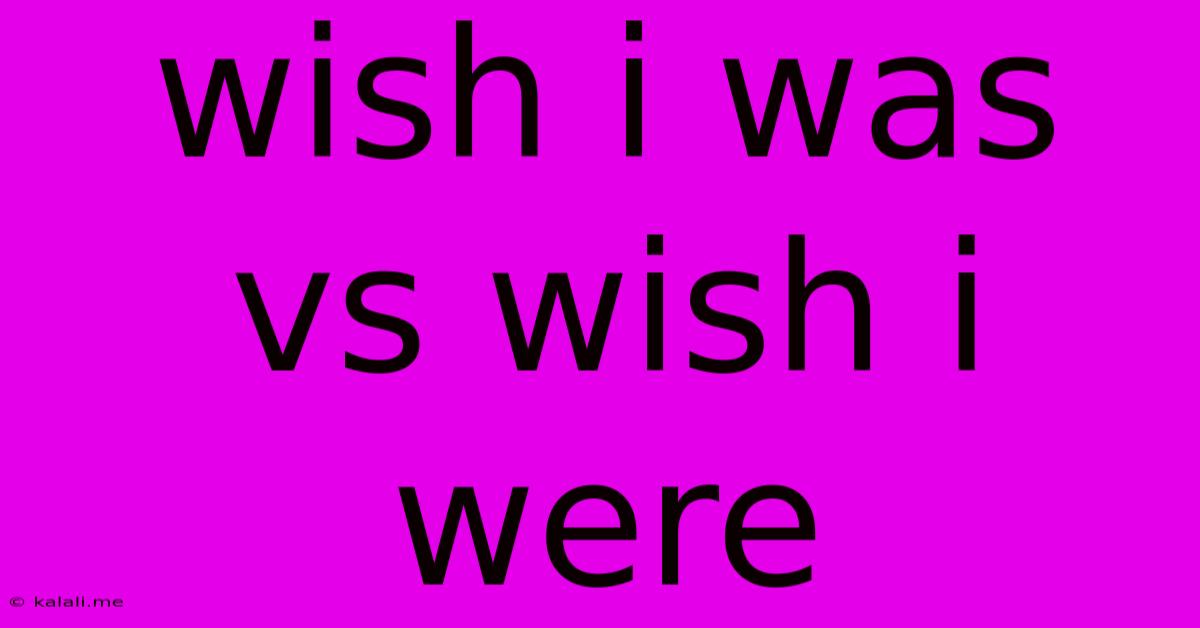Wish I Was Vs Wish I Were
Kalali
May 19, 2025 · 3 min read

Table of Contents
Wish I Was vs. Wish I Were: Understanding the Subtle Difference
Choosing between "wish I was" and "wish I were" can be tricky, even for native English speakers. This seemingly minor grammatical point often trips people up, leading to confusion and potentially incorrect usage. This article will clarify the difference, providing you with a clear understanding of when to use each and improving your grammar and writing skills. Understanding this distinction will help you write more accurately and confidently.
The Core Difference: Verb Tense and Mood
The core difference lies in the verb tense and mood being used. "Wish I was" is a colloquialism, commonly used in informal speech and writing, while "wish I were" is the grammatically correct form, particularly in formal settings. Both expressions indicate a desire for a different reality, but they express this desire using different verb forms.
-
"Wish I was": This phrase uses the past tense of the verb "to be" ("was"). While widely used and understood, it technically violates grammatical rules relating to the subjunctive mood.
-
"Wish I were": This uses the subjunctive mood of the verb "to be" ("were"). The subjunctive mood expresses a hypothetical or unreal situation, perfectly fitting the context of a wish.
When to Use "Wish I Were"
The subjunctive "wish I were" is generally preferred in formal writing and situations where grammatical accuracy is paramount. It's the more polished and grammatically correct option. Use it when:
- Writing formally: Academic papers, professional emails, and formal letters all benefit from the precision of the subjunctive mood.
- Expressing a strong hypothetical: The subjunctive emphasizes the unreal nature of the wish, highlighting the gap between reality and desire.
- Seeking a higher level of sophistication: Choosing "wish I were" demonstrates a more refined understanding of grammar.
When "Wish I Was" Might Be Acceptable
While grammatically less precise, "wish I was" is acceptable in informal contexts. It's widely understood and used in everyday conversation and casual writing. You might use it when:
- Speaking informally: Casual conversations with friends and family generally tolerate this less formal usage.
- Writing informally: Blogs, social media posts, and personal emails often embrace a more relaxed grammatical style.
- Mimicking a specific dialect: Some regional dialects or informal speech patterns might favor "wish I was."
Examples Illustrating the Difference:
- Formal: "I wish I were taller so I could reach that top shelf."
- Informal: "I wish I was on a beach right now."
- Formal: "I wish I were a better singer."
- Informal: "I wish I was more organized."
Beyond "Was" and "Were": Extending the Subjunctive
The principle extends beyond just "was" and "were." The subjunctive mood is used with other verbs to express hypothetical or unreal situations. For example:
- "If I were you, I wouldn't do that." (Subjunctive)
- "If I was you, I wouldn't do that." (Incorrect, but commonly used informally)
Conclusion: Strive for Accuracy and Context
While both "wish I was" and "wish I were" are understood, choosing the grammatically correct option demonstrates attention to detail and linguistic precision. In formal settings, always opt for "wish I were." In informal settings, the choice is more flexible, but understanding the nuances helps you write with greater accuracy and confidence. Remember to always consider your audience and the context of your writing.
Latest Posts
Latest Posts
-
Hard Wired Smoke Detector Going Off For No Reason
May 20, 2025
-
Difference Between A Movie And A Film
May 20, 2025
-
Another Word For Make A Decision
May 20, 2025
-
How Long Does Bolognese Last In Fridge
May 20, 2025
-
Does Christmas Need A Capital Letter
May 20, 2025
Related Post
Thank you for visiting our website which covers about Wish I Was Vs Wish I Were . We hope the information provided has been useful to you. Feel free to contact us if you have any questions or need further assistance. See you next time and don't miss to bookmark.